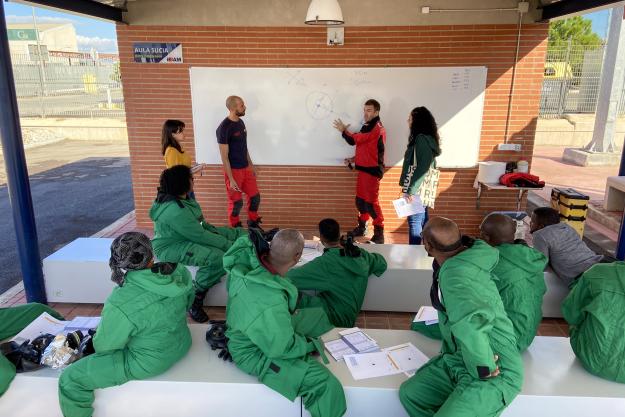
THE HAGUE, Netherlands—18 November 2022—The Organisation for the Prohibition of Chemical Weapons (OPCW) and the National Authority of Spain for the Prohibition of Chemical Weapons held a basic assistance and protection training course for African first responders in Murcia, Spain from 7 to 11 November.
The course, which was supported by the European Union and the Murcia Fire Brigade, focused on building the theoretical knowledge and practical skills for initial responses to incidents and emergencies involving toxic chemicals. During the course, theoretical lessons and practical exercises were combined to strengthen the emergency response capacities of the participants covering aspects such as personal protective equipment, decontamination, detection, and sampling. Participants had the opportunity to work with different levels of protection in different emergency scenarios at Murcia City Council Fire School (EBAM).
The African experts participated in an exercise which simulated an attack with chemical warfare agents. The participants had the opportunity to apply different procedures for the control and coordination of the emergency response.
H.E. Mr Mika-Markus Leinonen, EU Liaison Officer to the Hague, remarked that “the EU remains committed to enhancing international cooperation and capacity-building through its sustained support for assistance and protection activities, in particular through the OPCW Africa Programme”.
The course was opened by the Mayor of Murcia, Mr Jose Antonio Serrano who remarked that “during this course, Murcia Fire Brigade will share its expertise dealing with chemical emergencies, and Murcia City will become a place where international experts from Africa Region can share experience, and good practices on assistance and protection.”
The course was delivered by a team of instructors from the Murcia City Fire Brigade, Murcia Region Fire Brigade, National Police-TEDAX, and the Spanish national Designated Laboratory, LAVEMA, at the Murcia City Council Fire School (EBAM).
The event was attended by 17 participants from 15 OPCW Member States in the Africa region: Angola, Cameroon, Côte d’Ivoire, Kenya, Liberia, Madagascar, Mauritius, Morocco, Namibia, Nigeria, Sierra Leone, Sudan, South Africa, Togo, and Uganda
Background
This course was conducted under Article X of the Chemical Weapons Convention, under which Member States “have the right to participate in, the fullest possible exchange of equipment, material and scientific and technological information concerning means of protection against chemical weapons.”
The Programme to Strengthen Cooperation with Africa on the Chemical Weapons Convention — known as the Africa Programme — focuses on the needs of OPCW Member States on the continent, including the promotion of uses of chemistry for peaceful purposes to support a safe and secure Africa.
As the implementing body for the Chemical Weapons Convention, the OPCW, with its 193 Member States, oversees the global endeavour to permanently eliminate chemical weapons. Since the Convention’s entry into force in 1997, it is the most successful disarmament treaty eliminating an entire class of weapons of mass destruction.
Over 99% of all declared chemical weapon stockpiles have been destroyed under OPCW verification. For its extensive efforts in eliminating chemical weapons, the OPCW received the 2013 Nobel Peace Prize.
